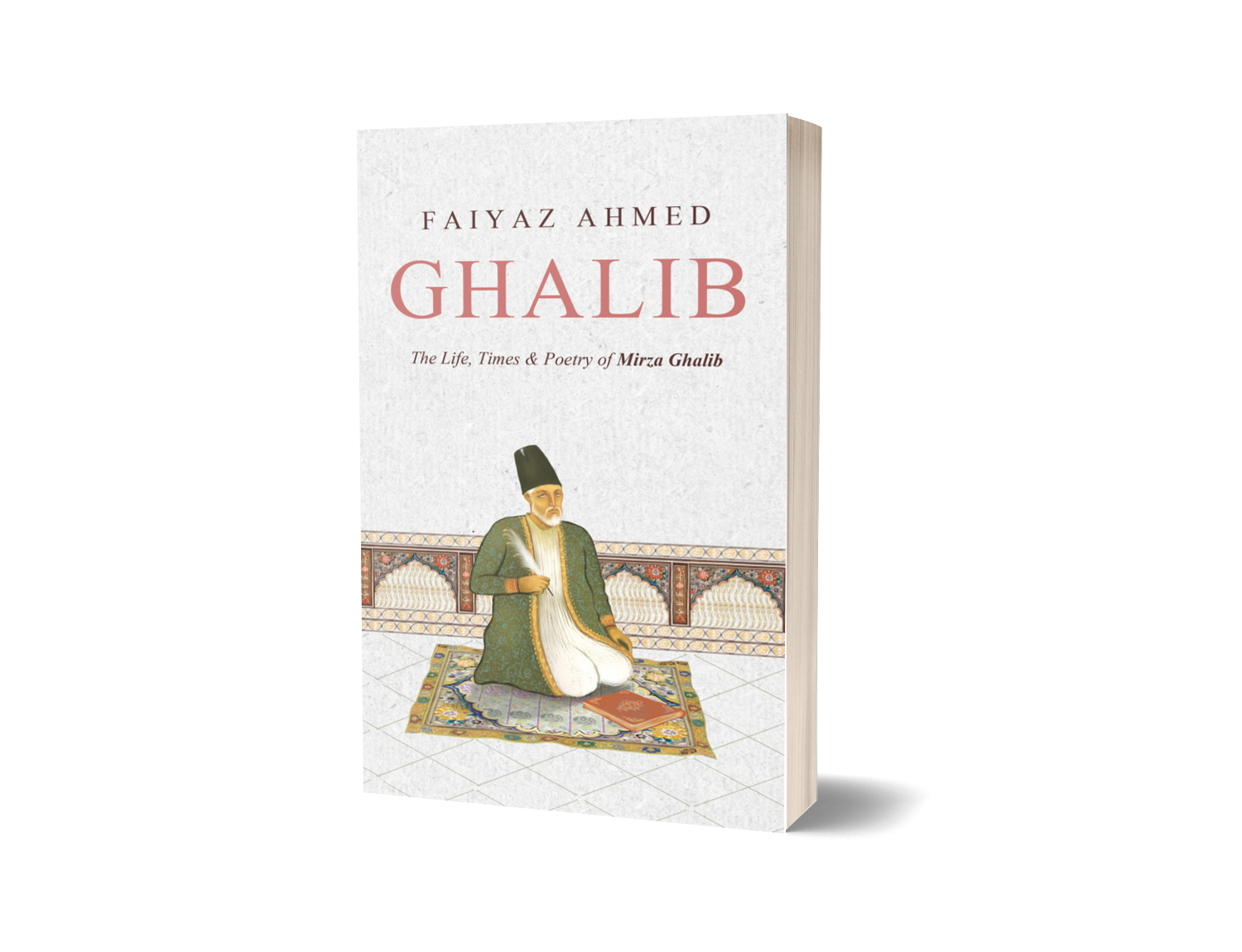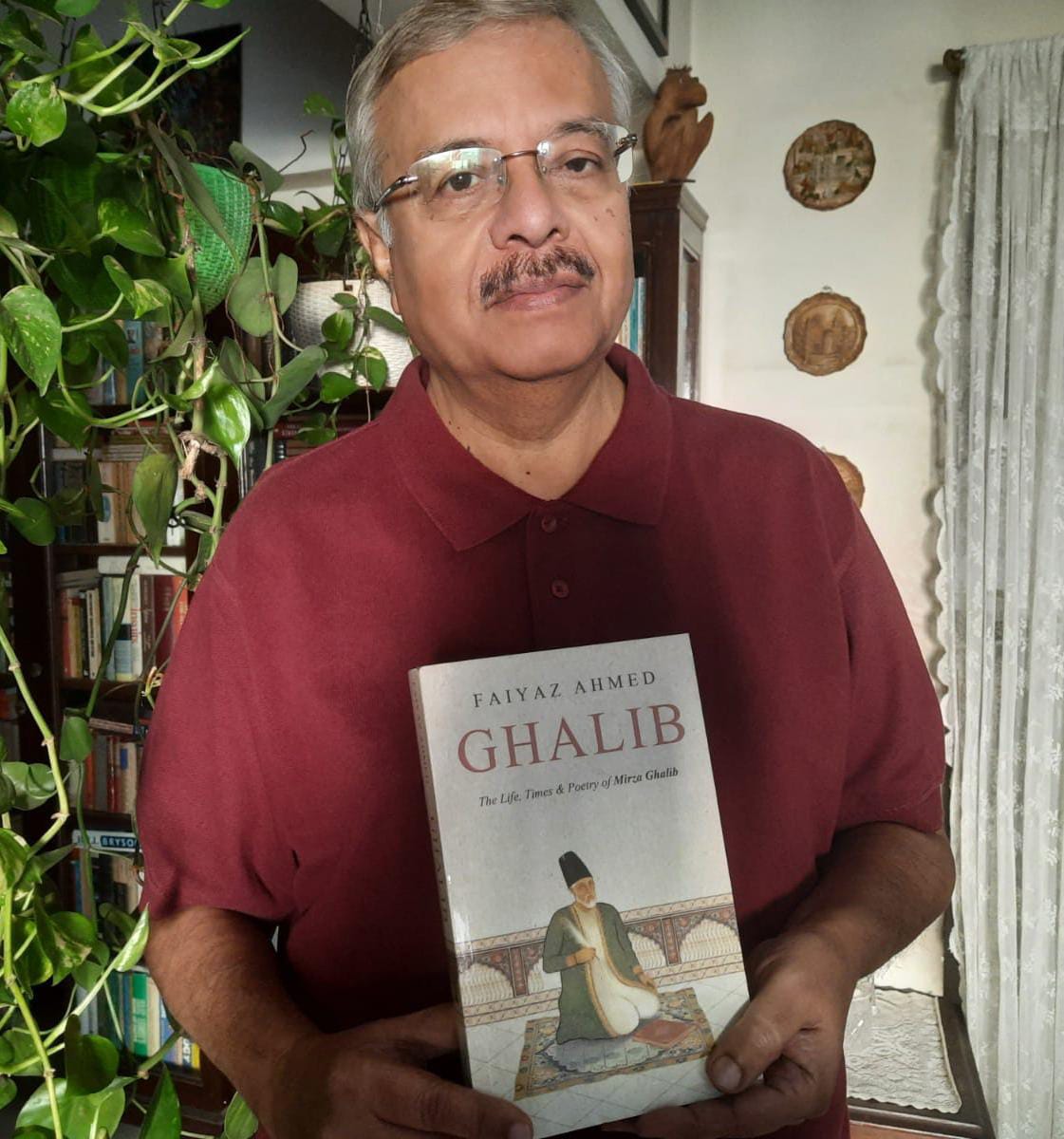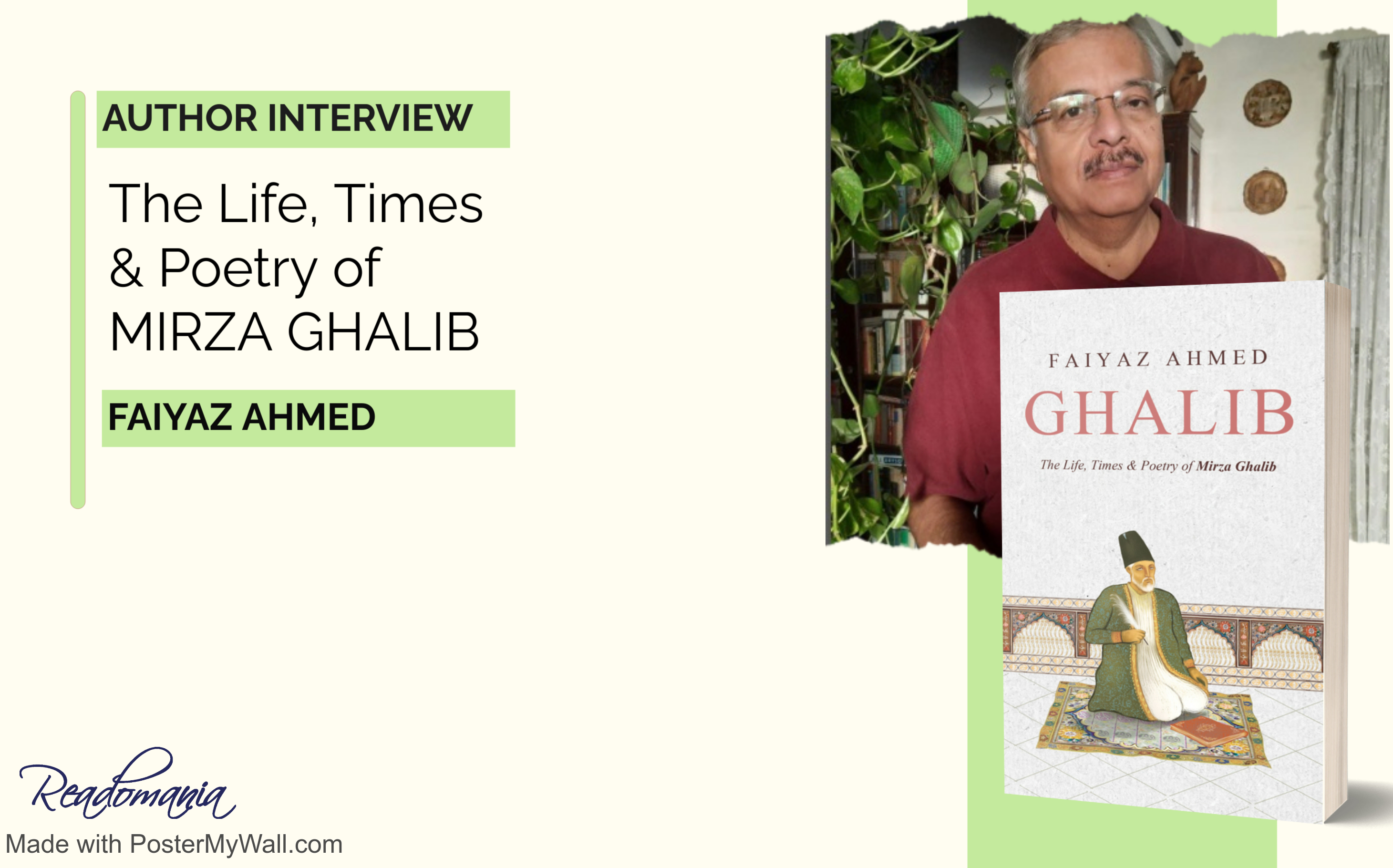Hello Mr Ahmed! Congratulations on the publication of your book on Ghalib!
Readomania: This is your first book. You are a finance professional and a trained Economist. What led you to take up writing?
Faiyaz: Reading has been my passion since I was in my teens. I started with James Hadley Chase’s This is for Real which a neighbour gave me. It is a fast-paced crime novel and it hooked me. After that I read all the Chase novels, I could lay my hands on. This continued till the end of my ISC Examination. Then I enrolled as a member of the British Council Library in Calcutta. It opened to me a vast reservoir of riches and I entered that world with absolute fascination and infinite delight. Chase was forgotten forever. It was during this time that I conceived the idea of writing my own book. At that time of course, I had no idea of the subject but it was clear that it would be non-fiction because I had realised by then that creative fiction was not my cup of tea. During my college days I wrote a few pieces for magazines but after that life as a banker gave me little time to engage in writing. It is only after taking up voluntary retirement that I decided to devote my self seriously to writing.
Readomania: What made you choose to write on Ghalib?
Faiyaz: My first encounter with Ghalib was through my father’s collection of the divans of Urdu poets. The first thing that attracted me was the slim blue bound editions of the divans of Dard and Ghalib. Most of the other divans were rather bulky. Since I had heard Ghalib’s name quite often, I decided to go through his divan first. The very first sher of the first ghazal impressed me profoundly though I had not the faintest idea of its meaning. There was a certain attractiveness and a mystery about the verse which was both enjoyable and alluring.
Fortunately, the difficulty of the first ghazal did not deter me from proceeding further and exploring the richness of Ghalib’s poetry. It was a difficult task and in spite of Urdu being my mother tongue, the task was all but easy. I continued to wrestle with Ghalib’s poetry and the desire to know about the poet behind this intrinsically complex poetry led me to read about his life. Life would have continued in this vein but for a concatenation of circumstances which transported me from UAE to India and thence indirectly to Ghalib.
It was during our stay in Dubai that the idea of writing on Ghalib was first conceived though in a rather vague manner. Once, in a moment of indiscretion, I recited my translation of a sher of Ghalib to my wife and this let loose the chain of events that ultimately led to the book after many long years. She was insistent that I translate the whole ghazal. Upon its completion she was of the view that I continue with the translation of the other ghazals. When my daughter joined the chorus for translation, I knew that it was going to be a losing battle for me. Thus began my work of translating the ghazals of Ghalib. After we returned to India, the idea of writing a book on Ghalib took a firm root in my mind. It was then that I discovered that there was not a single book on Ghalib that covered both his life and poetry and I decided to take up the challenge. The book under discussion was the result.
Readomania: There are hundreds of books on Ghalib. How is your book any different from the others?
Faiyaz: There is no doubt that books on Ghalib abound. In fact, the total number of books on Ghalib exceeds the number of books on all Urdu poets since Ghalib. But most of these books deal either with his poetry with very perfunctory details about his life or his life with very few samples of his poetry. I am not aware of any book which gives equal weightage to both his life and poetry. This is the major difference between my book and others. Another unique feature of my book is that it includes a brief description of the evolution of the Urdu language to enable the reader to familiarise himself with the poetic tradition of Urdu till the time of Ghalib along with brief pen portraits of the major Urdu poets and samples of their verses.
Readomania: Tell us something about the sources you consulted and the research you engaged in while writing on Ghalib.
Faiyaz: Apart from Ghalib’s Divan, the primary sources are Ghalib’s letters in Urdu and Persian, his petitions and correspondence with the British regarding his pension, his short diary of events, Dastanbuy, post the uprising of 1857, the record and recollections of his contemporaries, et al. The important secondary sources are the poet’s biography by Altaf Hussain Hali, Ghulam Rasool Mehar, Sheikh Mohammad Ikram, Malik Ram in Urdu and Khurshidul Islam and Ralph Russell, Pavan K Varma and Natalia Prigarina in English and commentaries on Ghalib’s poetry by Hali, Ali Hyder Nazm Tabatabai, Abdur Rahman Bijnori, Sheikh Md. Ikram, Shamsur Rahman Faruqi and others. Finally, there was a large body of literature that provide the historical and literary context. Some of them are listed in ‘Works Cited’ section of the book.
Readomania: What are the challenges you faced while translating Ghalib?
Faiyaz: Ghalib has been translated into a host of languages from Bengali and Marathi to Russian and German. But translating Ghalib is an exercise that is both challenging and frustrating. Ghalib in translation can rarely evoke the sublime beauty, the lyricism, the imagery, the flights of thought or the cadence of the original poetry in Urdu. A language, as it evolves, embraces within its fold the entire spectrum of the social, economic, cultural, political and religious aspects of the society from which it originates. Thus, the role of a translator goes beyond substituting words in one language with those in another and extends to conveying the nuances and ethos of one culture into another. In view of these inherent linguistic and cultural differences the task of the translator becomes both complex and difficult.
In a letter to Bertrand Russell, the Hellenist Gilbert Murray, who has translated many works of Greek literature states, ‘And then the thought has always come to me, that there were dozens of translations of the Greek Tragedians in all the second hand shops; and that I could not read any of them with the least interest; and that probably the authors of nearly all of them had felt exactly as I was feeling about the extraordinary beauty and power of the matter they were writing down. A translator, if he takes pains, naturally gets nearer to understanding his author than an ordinary reader does; and every now and again the poem means to him something approaching that which it meant to the poet… Of course, all authors – in different degrees, but all enormously – fail to convey their meaning. And translators, being less good writers and having a harder task, fail even more deplorably. That is the normal state of the case….’[1]
That sums up the dilemma of every translator and I am no exception. A translator’s job is never finished. A good translator is a deeply discontented person at the intellectual level.

Readomania: How did Ghalib's mastery of language and his use of symbolism and metaphor contribute to the depth and richness of his poetry?
Faiyaz: Traditionally, critics and readers alike have regarded Ghalib as a difficult poet. However, this has not stopped him from being the bestselling Urdu poet in the world. But the difficulty of Ghalib’s poems does not rest upon the use of uncommonly used words or phrases, the Persianized language of his ghazals, the use of compound words, uncommon metaphors and similes, his imagery often elusive and enigmatic, and the depth of emotion that his lines invoke. Ghalib’s difficulty stems from the fact that his verses are capable of a variety of meaning and interpretation. As SR Faruqi has rightly pointed out, a poet’s work could be difficult for a variety of reasons – verbosity, archaic words and phrases, complex metaphors—or it could be the difficulty in decoding the meaning of a verse though there may sometimes be none of the elements are present in his poetry. Though all these elements are present in Ghalib’s poetry, the primary difficulty with his poetry is of the second type and that is one of the reasons for his perennial charm.
Readomania: How did Ghalib's poetry challenge and subvert traditional poetic conventions?
Faiyaz: It is one of Ghalib’s great poetic ability and linguistic virtuosity that he rarely complains about the medium. He modulates his poetry to suit the medium rather than the other way round. During the late nineteenth and early twentieth century, there was a spate of sustained attack on the ghazal as a genre but Ghalib, except on one occasion, rarely blamed the medium. Like all great poets he stretched the limits of the ghazal without actually snapping it. In the process he succeeded in showing both the elasticity and the sustainability of the ghazal as a genre of Urdu poetry. Today, the ghazal continues to be the most popular genre in Urdu poetry.
Ghalib had many pupils but none can lay claim to his style. There is hardly an Urdu poet since Ghalib who has not been influenced by him in some manner. In fact, he has paradoxically been referred to as the last of the classical poet as well as the first modern poet of Urdu. His legacy lives on in countless adaptations, translations, and interpretations and the thought and emotions that he invokes in his readers will always ensure that his voice continues to resonate for generations to come.
Readomania: Did you have any target audience in mind while writing the book?
Faiyaz: I have tried to write a book that is both scholarly and accessible. It is primarily meant for those who have heard of Ghalib being a great poet but have very little idea of his life or poetry. It is not meant for scholars though, I am sure, they too will find something interesting in the book.
On a broader level, my book is for anyone who is curious about Ghalib and his poetry, who appreciates the beauty of language and seeks answers to the fundamental questions of life in the depths of poetry. Ultimately, I hope readers will emerge from this book with a deeper understanding of Ghalib's life and poetry, a renewed appreciation for the power of language, and a sense of wonder at the mysteries of the human mind and emotion.
Readomania: Thank you for talking to us, Mr Ahmed. We wish you continued success in all your creative ventures.
[1] Letter to Bertrand Russell dated March 2, 1901 included in The Autobiography Bertrand Russell 1872-1914, George Allen & Unwin Ltd, London, 1967, p. 156-57.

Faiyaz Ahmed is an Economist by training and a banker by profession. He attended Don Bosco School, Park Circus, Kolkata and completed his post-graduation in Economics from Presidency College, University of Calcutta.
He joined the State Bank Group as a Probationary Officer in 1983 and has had a fulfilling career as a banker working in multinational banks in India and abroad. After devoting nearly three decades to banking and finance, he took voluntary retirement and decided to spend the next three decades in reading and writing.
Faiyaz’s hobbies include reading—with special interest in Literature, History and Socio-economics—listening to classical ghazals, cooking and travelling. He is married and has a daughter. The book on Ghalib is his first offering.


Comments